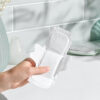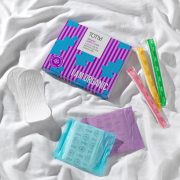Since joining TOTM, I have learnt about mainstream fem care products, what they are made of and that manufacturers aren’t required to list their ingredients.
So, you’d think I wouldn’t be too shocked to learn about the potential dangers lurking in my makeup bag…Well, you’d be wrong.
Have I unknowingly been exposing myself to dangerous chemicals?
There are thousands of articles about harmful chemicals in cosmetics but it’s difficult to know what to believe so I decided to do some research of my own.
The regulation body for the cosmetic industry is the Food and Drug Administration (FDA). From what I can tell, they’ve faced a lot of criticism over the years for turning a blind eye to the problems that exist. Worryingly, the FDA’s Cosmetic Act hasn’t been updated since 1938, when the entire makeup and skin-care industry was unregulated.
Could my quest for beauty be killing me…slowly?
I certainly find it troubling that there are no strict laws governing the quality and production standards of the cosmetics I use every day. However, it is worth noting that there are bodies trying to do good in the UK industry, including the Cosmetic, Toiletry and Perfumery Association.
I read eco-expert, Gillian Deacon’s 2010 book ‘There’s Lead in Your Lipstick’ in which she states that by the time she heads out the front door, the modern woman has spritzed, sudsed, and slathered herself in more than 127 different chemicals, many of them more toxic than beautifying.
Makes you think, doesn’t it?!
Turns out, she was ahead of her time, as it wasn’t until last year (2016) when the FDA issued a draft of future guidelines to the lipstick industry about the use of lead. This topic really worried me because this is a known human carcinogen, which can cause miscarriage and infertility. Bold lips have become a real makeup trend over the last couple of years, which lots of young girls are latching on to.
Scientist and environmentalist David Suzuki goes even further when discussing this topic. He states that one in eight of the 82,000 ingredients used in personal care products are industrial chemicals, including carcinogens, pesticides, reproductive toxins, and hormone disruptors. He claimed that many products include plasticizers (chemicals that keep concrete soft), degreasers (used to get grime off auto parts), and surfactants (they reduce surface tension in water, like in paint and inks).
I hate to think what that does to your skin, and the environment!
His 2010 report of Canadian cosmetics found that 80 per cent of the products entered contained at least one of the toxic ‘Dirty Dozen’ cosmetic chemicals to avoid.
Regulations of the UK cosmetics industry got an overhaul in 2012, coinciding with the PIP breast implant scandal, and of course as time has progressed some bad practices will have been eliminated. From everything I read, there are still lots of things which did concern me.
In 2014, TreeHugger published an interesting article called ‘20 toxic ingredients to avoid when buying body care products and cosmetics‘. They say the industry is so shockingly unregulated that it’s usually impossible to trust the claims that manufacturers place on their products.
Are ingredient lists misleading me?
Something that I found particularly shocking is that, unlike food, there is currently no legal standard in place for organic beauty. This means products can be labelled as ‘natural’ or ‘organic’ and contain little to no organic ingredients. I researched this and it seems if you’re unsure and want to play it safe, opt for products with the Soil Association certification logo. These are your best bet because they’ve met a strict set of criteria.
The Soil Association also has some fantastic advice I read about what’s not ok in your beauty products. Their list includes MI/MIT/MCI (a common irritant found in cream cleansers), dimethylol (antimicrobials that prevent bacteria growing in cosmetic products found in bath products and foundations) and non-natural propylene glycol (a skin conditioning agent found in creams, moisturisers and lotions).
We need more clarity and greater transparency.
On 24th April 2017, the Soil Association will be launching, ‘Campaign for Clarity’, all about ending greenwashing in the beauty industry, which I’ll be keeping an eye out for too.
I really like Breast Cancer UK’s ‘#DitchTheJunk’ campaign. It encourages women to reduce their exposure to chemicals that may be linked to breast cancer by avoiding products containing the worst offenders. These include parabens, phthalates, triclosan, synthetics musks and formaldehyde. They’ve got lots of easily digestible information, which is worth checking out.
How has it impacted how I buy cosmetics?
I ditched deodorant spray quite a while ago because someone told me it contained aluminium. Have you ever done that? Where you switched products but not fully understood why?
I never would have imagined the risks it posed and I used it for so many years! Turns out, it might be linked to breast cancer, Alzheimer’s and infertility, amongst other health problems. I just personally did not want to take any risks!
For me, avoiding cosmetics that list ‘fragrance’ as one of the ingredients is an easy one. I’m opting for ones that use plant oils and natural essences instead.
Following my research, I certainly plan on auditing my bathroom cupboard and makeup bag more thoroughly. I also want to read more about this topic as it’s really opened my eyes to potential issues in the cosmetics industry.
What you can do.
The good news is that natural cosmetics, free from harmful substances, are readily available. Personally, I like to search ‘natural’, ‘organic’ or ‘chemical free’ cosmetics online for inspiration. For online shopping, I love The Clean Beauty Company. Before I head out to the high street, I feel reassured by checking ingredient lists before I go so I don’t choose products which contain chemicals of concern.
There are also lots of natural beauty blogs online with tips that I found very helpful. Some of my favourites are Ana Goes Green, The Organic Beauty Blogger and Eloise Loves Nature. Alternatively, you could always make your own cosmetics, Pinterest is a great place to start for recipes or guides.
I am certainly no medical expert, so if you’ve been affected by anything you’ve read, don’t just take my word for it. It’s always worth doing some research of your own and seeing what does and doesn’t concern you. I’d love to hear your thoughts!
Written by TOTM Comms Manager, Daisy Pratt*
People never like to find out products they have trusted for years could be harming them so this is an interesting topic. Let me know what you think in the comments below.
Disclaimer: this blog is just my personal opinion. My comments are based on my own research and thoughts on this topic. I have no medical experience or qualifications and I don’t pretend to be giving medical advice.





